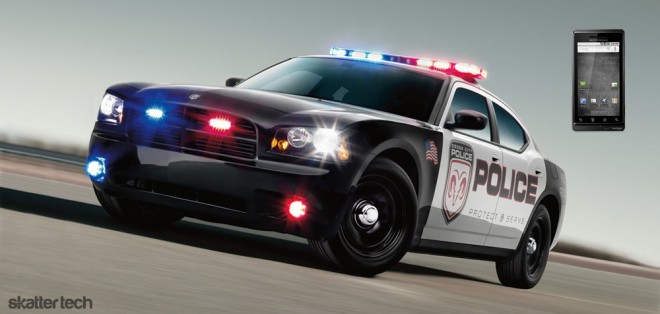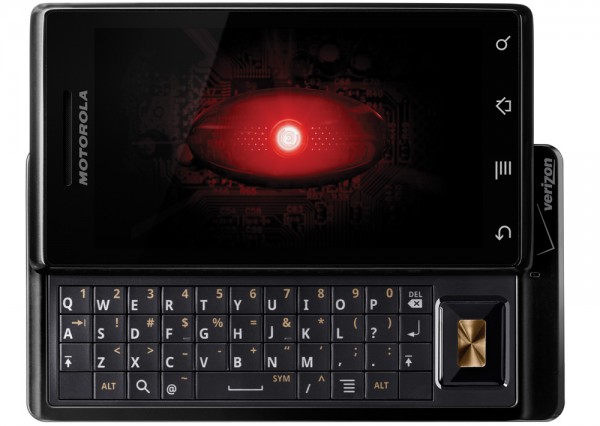Last year a traffic cop pulled me over while driving home and handed me a speeding ticket. Although nervous and somewhat startled since it was my first time getting caught, I ended up walking out of traffic court a few months later without having to pay a fine or adding a single point to my record. Surprisingly, it was all thanks to my Android-powered smart phone and a little creativity.
My First Speeding Ticket
As a brand new Motorola Droid owner, I was in the rush of trying just about every app that appeared in the Android Marketplace. One that particularly stood out and had me excited was My Tracks by Google. This free app records and visualizes your GPS data on a map, which is something I always wanted to try. I began using app while jogging, biking to class, and even when driving.
I fortunately happened to have Google Tracks running when an officer cited me for speeding while I was heading back home from a friend’s place. The speed limit in the area was a mere 25 miles per hour and the cop’s radar gun shockingly clocked me driving over 40 miles per hour. In a panicked mental state, I simply handed over my driver’s license, insurance, and registration information without asking any questions. I was confident that I was within the posted speed limit in the back of my mind, but I just apologized and went my way instead of speaking up.
Once I parked my car in the apartment lot, I immediately realized that I had Google Tracks running as a background process as I reached to grab my phone from the dashboard mount. As I walked in, I pulled up my history for the previous session which displays information such as distance, average speed, average moving speed, and max speed. It even stores maximum and minimum elevation levels for those that need it. More importantly, I found that my phone only recorded a top speed of just 26 miles per hour, significantly lower than the cited speed. I now knew I was not speeding.
Traffic Court or Traffic School
After heading to the Yolo County (California) Traffic Court website and doing some research I found that I had two options: traffic court or a fine with traffic school. Most friends and family suggested paying the fines and avoiding traffic court since it is usually impossible to win. I unfortunately did not have the cash to spare or time for traffic school with a busy college schedule. I soon decided to take my chances in traffic court, which would take place over six months down the road.
I decided to write down an account of the entire situation just a few days later and even exported the data from my phone to Google Docs so I would not lose or forget any important details. I even came across an ongoing Sonoma County Superior Court case regarding the accuracy of GPS devices and radar guns. I saved a few articles to back my claim that my account of the situation was debatable with the evidence from my smart phone.
Time For Traffic Court
Once I made my way into the court room after going through metal detectors, I had to sign a document to indicate whether I plea guilty or not guilty. I choose the latter and got seated. The judge called a few people to the stand before it was my turn. Most of them were wearing rugged clothing, screamed out loud a several times, uttered inappropriate language, and were extremely enraged. Each case resulted in a guilty verdict, which had me even more terrified.
I eventually took the stand nervously. The plaintiff presented information from city plans noting that my speed limit was inappropriate for the area. When it was my turn to make a statement, I remained calm and spoke respectfully. I was also glad that I wore business casual clothing, which always plays an important role in situations such as this one.
My Geeky Evidence
Taking hints from a lawyer that spoke on behalf of a defendant shortly before me, I decided to ask the officer a few questions about the day he cited me. It turned out that the officer did not recall the last time he attended radar gun training, when the device was last calibrated, or the unit’s model number. I then presented my time stamped GPS data with details about my average moving speed and maximum speed during my short drive home. Both numbers were well within the posted speed limits.
I also made it clear to the judge that I had no other prior driving records or violations. After a lengthy pause, the judge asked how I obtained the GPS tracking information. I provided a detailed explanation about my new awesome smart phone, the application in use, and how I exported the data. After questioning whether the data was reliable, I mentioned the in progress Sonoma County Superior Court trial regarding the same matter about the credibility of both technologies.
The Big Verdict
The judge took a moment and declared that I was not guilty, but he had an unusual statement that followed. To avoid any misinterpretations about his ruling, he chose to clarify his decision by citing the lack of evidence on the officer’s part. He mentioned that he was not familiar enough with GPS technology to make a decision based on my evidence, but I can’t help but imagine that it was an important factor.
What You Should Know
Before anyone goes out to try their luck with my story, I should make a few things clear. I have no legal experience what so ever. I also would like to also note that the purpose of this article is to focus on smart phone technology and issues with radar guns. The officer in question was doing his job and did not do anything wrong. I find that internet culture often likes to demonize misbehaving cops, which I hate hearing about. It is important to respect the men and women who put their lives on the line to keep our streets safe every day. With that being said, I hope that this article will be helpful to anyone who was wrongly accused due to inaccurate information from radar guns, which are rather complicated to operate compared to consumer friendly smart phones.










I learned in driver’s education class that while radar guns were (at that time and in that jurisdiction) accepted as a legitimate information gathering tool for law enforcement to determine if a law had been broken, the data thus collected was not necessarily legally considered evidence in a court of law. Furthermore, most speeding laws are written in such a way that the legal criteria is for the offender to be observed driving in a manner which is “reckless or endangering to life, limb or property” (or words to that effect.) Posted speed limits are usually legally considered to be merely sensible guidelines under normal conditions, for both drivers and law enforcement. As long as there is nothing reckless or dangerous about it, exceeding the posted speed limit for a moment may not (technically) be a violation of the law. That is still the case in many jurisdictions to this day- Go to the clerk of the court and ask for a copy of the law, which is listed on the ticket, to see exactly how it is written. There are scenarios where the safest and least reckless course of action involves speeding up momentarily to avoid a dangerous situation that could develop if you failed to do so. It is well within your rights to question accusations made against you. Arrive in court with a copy of the law in your hand, and politely ask the arresting officer why you were issued a ticket. “Officer, can you tell the court why you pulled me over? ” in many cases a radar unit display on its own will not hold up in court as evidence that a law was violated. “Officer, other than the radar display, did you have a reason for the traffic stop?” After demonstrating that the radar was the inspiration for the traffic stop, take care to use the exact language as the law is written in your questioning. “Officer, did you observe my driving to be reckless or endangering to the life, limb or property of any person, and if so, which person and which property?” Sometimes the arresting officer and or the prosecutor do not even know the actual wording of the law, and demonstrating that fact in court is much more helpful to your defense than it is to their prosecution.The vast majority of people just pay those kind of tickets, and most are probably guilty as charged. When mistakes are made (it happens) and someone who is not guilty of speeding is given a ticket, this kind of strategy can be very helpful in demonstrating a lack of proof. Meanwhile, drive safely and always treat law enforcement with the respect and consideration they deserve, even if they are writing you a ticket that you feel is undeserved. They are risking their life to protect society from very real dangers, never forget that!
FYI, there is no “plaintiff” in a traffic or criminal case. There is just the prosecutor (or, in this case, the police officer) and the defendant (you). Plaintiffs are in civil cases only.
What a suck-up! He’s certainly correct that preserving a professional demeanor in court is the best policy, but all that BS about police protecting the public is nonsense. This officer was generating revenue for his political subdivision, not protection anything. The best one can say about most cops actually dealing with criminals is that they sometimes remove the bad guys AFTER they commit a crime. They don’t PREVENT anything.
Yeah yeah… way to make up a story… I smell BS!!!
No matter how a person is dressed or what “tone” they strike in court, everyone has the right to be looked upon without prejudice in ANY court of law. I fought (and won) a speeding case in court several years ago by simply presenting the facts as I knew them, and no, I wasn’t dressed “business casual” and I didn’t try to hide my disdain for having to appear in court over some bumbling glorified revenuer’s idea of “keeping the streets safe”. I DID INDEED have better things to do with my time, and winning the case was a small consolation for having to go through the process of “defending” myself against a bogus speeding charge. If true justice were to have been a concern of the court I would have been compensated for my time and energy wasted in addition to having the ticket dismissed, no matter what shirt I was wearing or how I chose to speak to men and women out to play me for a buck. Traffic cops are by-and-large NOT out there saving the world, they’re collecting dollars, and people who run scared are the reason they’ve been able to keep up the racket and elevate it to the status of perceived legitimacy that most people take for granted. FIGHT BACK ALWAYS. Truth wins, PERIOD.
I have a hard time believing this. Any competent district attorney should be able to throw that “evidence” out. Basically in any traffic ticket the GPS, Cruise Control, etc. is not deemed reliable because of lack of calibration. The officer’s equipment undergoes routine maintenance to verify integrity. If the officer clocked you, and the equipment was in good standing, you’re arguably guilty. Personally, I’ve fought and won multiple traffic infractions in court (and set a precedent in my state with one of them), but would never rely on GPS to get me out of the hole.
So your alleged victory goes down to case law: “I mentioned the in progress Sonoma County Superior Court trial regarding the same matter about the credibility of both technologies.” I’ll search for that case since you did not cite it, but I feel there is a lot more to this law. Lastly, the application of that case law will be limited to your state or maybe even smaller jurisdictions…. I doubt other people will be this lucky.
Well done!
Don’t respect them, they don’t deserve it.
My “smart” phone gives me wildly different speeds that are inconsistent along the same paths.
I would suggest changing your title as it is misleading at best.
Oh wow. This is an amazing story. I should try this app on my android EVO. Wondering how the battery consumption on this would be if I leave it on for the whole day.
I have been using it on my HTC EVO. The battery will die quickly, very quickly. If you use it in your car, you should definitely have it plugged into a charger.
How can you be against “demonizing misbehaving cops” and claim they keep the streets safe? If any public official is misbehaving outside the bounds of the law you have a duty to demonize them. A police officer fabricated evidence against you to generate revenue. Please explain how writing tickets to generate revenue even if you were going 40 mph is keeping anyone safe from crime?
Thats good experience which ended well for you. I really liked the ending of your article under ‘What you should know’ your commentary certainly enlighten everyone to abide by law. Further the importance of your decent behavior and language in the court is well explained demonstrating its importance. Along with your useage of mobile phone application, the presence of mind at the court during other case investigation and picked up the points to question the officer was also equally important.
Good going.
If an officer is stationary on the opposite side of the road when he tracks your car with his radar device, can he be certain it is your car that he is tracking? Can this be used as an effective argument in traffic court?
There is one part of this story which could be halpdul even without a smartphone. Always ask the officer if they remember the incident. Chances are if you were polite, and it is some months ago, they will not. The judge may well dismiss as the officer is unable to testify. I agree it is always better to be kind & courteous. In my case, it saved me a fine I could not afford!
Dude, in most states, the proof you provided (that you were in fact exceeding the limit by one mph) would be enough to convict you. However, b/c of the disparity b/wn the state’s accusation and actual proof of the ir exaggeration, I would’ve voted “n g.”
I received a ticket approximately two months ago. Turning on to a highway access road adjacent to a highway with a 70MPH speed limit. I have never seen a 35MPH limit on an highway access road like this and without seeing a speed limit sign I accelerated to 45MPH. As soon as I saw the 35MPH speed limit sign, I immediately decelerated, however, at about the same time, I also noticed a police car shooting radar ahead. I received a ticket for 46 in a 35 and was advised that this (35MPH) was the speed limit set by the TXDOT and that the city (Carrollton) had nothing to do with it (I guess he has to tell everyone that because it appears to be a “speed trap”).
I opted for taking Defensive Driving in lieu of paying the ticket. Since I seem to get one every four or five years, this is what I typically do, and since I drive 500-1,000 miles a week as part of my job and don’t want to get another one (at least until I can qualify for Defensive Driving again), I am very careful to be within the speed limit at all times. In fact, even when the speed limit is 70MPH, I typically set my cruise control to 65MPH. It ensures that in most cases, if the speed limit drops, I’m OK. If it drops more than five MPH, there will typically either be a “Reduced Speed Ahead” sign, or changes in the highway will alert me to the fact that the speed limit already has or will change very shortly (usually entering towns on rural highways). Driving 65MPH instead of 70 also gives me about three MPG better gas mileage.
Several weeks ago, I was driving North from South Texas (McAllen/Harlingen area). The last speed limit sign I saw said 70MPH and I had my cruise control set to 65MPH. A car approached quickly from behind and equalized his speed with mine just to the rear of my rear drivers-side quarter-panel and was there for some time. I was watching him in my side-view mirror and because it was dark (after 8P at night) and there are absolutely NO street lights in the area, I didn’t know it was a state trooper. I just about drove the car off the road when, as I was watching him in the side-view mirror, he switched his (car-top) lights on. When he came to the car, he told me I was speeding…doing 70MPH in a 65MPH zone. I was respectful, but explained about my prior ticket and that I was being extremely careful and even in 70MPH zones routinely (at this point ALWAYS) set my cruise-control to 65, but he INSISTED that I WAS speeding and that his equipment was “state-of-the-art” and therefore, could NOT be wrong. He asked if my van had the original sized wheels/tires on it, offering that if it did not, that that could be the reason for my (supposed) excessive speed. I advised no, they were the stock/standard wheels/tires. After looking all through my van with his flashlight, he told me that he was going to give me a “warning”, which he did.
Interestingly, in the spot where he would have filled-in the number of miles I was “over” the speed limit, it was left blank. I don’t know if this is standard procedure, or if the troopers in this area, when they pull someone over as a routine stop, tell folks they were speeding to justify the stop and give them a warning.
I know this area has lots of problems with people smuggling drugs and illegal aliens. I also know that law-enforcement agencies have sensors along the road that can detect lots of things in cars as they drive by (supposedly drugs, U.S. currency, etc). I saw them on my way down there the previous Monday. They looked like about four (or more) tripods with “camera-like” things mounted on them on each side of the road…with the same quantities on both the North-bound and South-bound directions of the highway (interestingly, a doing a Google search, I couldn’t find anything about this equipment, but an aunt and uncle that live in Harlingen told me what the equipment did).
Because I carry a large amount of the product I sell in my car, and that product is made of metal, I believe that I was pulled over because one of these sensors went off as I drove by. I’m just a sales-guy trying to sell my companies products. The worst trouble I’ve ever been in with the law are the half-dozen, or so, traffic tickets I’ve had over my 33 years of driving. If the trooper had just told me that was the real reason he was pulling me over, I would have been fine with it, but I’m a little annoyed that (I believe) he used a ruse as justification for pulling me over and effectively lied about my (supposed) speeding.
You are a disloyal subject who refuses to pay the road tax to support the benefits of brave heroes like the police officer who loyally manned the speed trap that day. If everyone ducks their civic duty like you, how is the city supposed support these fine officers with barely-adequate six figure salaries and full pensions after 20 years? You should be ashamed of yourself, making it so hard for these gallant men in blue to “just do their job.”
I find this highly unlikely or very lucky. Why would you have MyTracks running while driving? Unless you are completely paranoid, having mytracks running all the time while driving makes no sense. it eats up a lot of memory and an incredible amount of battery life. It is great for going hiking, skiing, places in the outdoors, but while driving? Dont believe it.
So basically, this entire story is a non-story. GPS has nothing to do with it. The fact you “believe” it had something to do with it is naive and irrelevant.
The judge can’t take the evidence presented because it wasn’t calibrated, just like the radar wasn’t calibrated. Why would he use your evidence over a cop’s? His answer was clear, you got off because the cop didn’t have the proper documentation.
The fact that you “think” the GPS had something to do with you getting off is naive and retarded.
Conveniently, 25mph= 40kilometers per hour. If the police officer accidentally activated the “metric” option on the radar gun you could immediately see the discrepancy that he wrote the ticket for.
Wow, this is awesome! Great job, damn i gotta have that on every time i drive!
This wouldn’t work in Philadelphia. The traffic courts are totally corrupt with judges who are appointed, not elected – many with no legal training. The cops don’t even have to show up and their “testimony” is simply what they wrote down when writing the ticket. The suburbs have substantially more educated personnel working in the courts.
Unfortunately, this tactic has been tried before and always fails to impress the courts. First of all, cell phone apps must be designed to work efficiently with the phone, otherwise, if it becomes a power hog and drains the phone battery, it won’t be well received. As a result, the GPS sample rate (the times it enables the GPS receiver) is generally quite slow as compared to a dedicated GPS device powered by the car’s electrical system and where power is therefore not at issue. The slow sampling rate results in an inaccurate translation of ground speed as it can only average between sample points which can be, for various reasons such as foliage, buildings, weather and other obstacles, extremely lengthy between updates. The longer the time between samples, the less the resultant outcome will approximate the instantaneous speed of the vehicle which is what radar is designed to do. A lidar, like GPS, is an average speed calculator but it’s sample rate is so fast, a speed determination is accomplished in less than one half second. This case was a classic example of the state failing to be reasonably prepared so they lost it on that basis, not the introduction of questionable GPS data. Nice try but no cigar. The conclusions assumed by the author don’t match the true facts of the case.
Congratulations for the winning on the battle… Smart Phone vs. Radar Gun.
I think it wasn’t just mere luck. It was quite a brillant idea to check your smart phone and you also collected evidence against radar guns.
Have you thought of law school?
great story mate. I wish I had the same fortitude if I ever get into a muddle like that! Been driving for 20 years and not a single ticket. Everyone tells me its only a matter of time before the traffic cops get me as they have become more liberal with ticketing last couple of years!
I think am mod definitely getting one of that app. Yeah I guess at the back of my mind I do appreciate the job done by the folks in uniform, but am also apprehensive about a run in with the system as it seems one can never win against that..